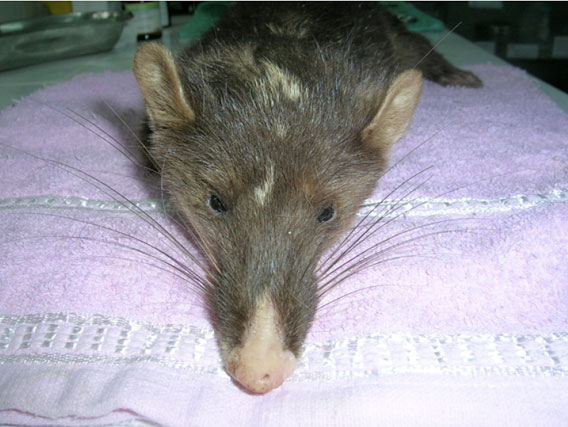
Photo of first individual of new ferret-badger species that died in cage. Photo by: Elke Schwierz. - See more at: http://news.mongabay.com/2011/1128-hance_ferretbadger.html#sthash.siT7HUEz.Igrf
A new species of omnivorous mammal has been found in Cuc Phuong National Park, Vietnam. A part of the weasel family, the new species is known as a ferret-badger, a strange subfamily of mammals that have been little-studied by researchers. Smaller than proper badgers, ferret-badgers have elongated faces and long bushy tails.
Described in Der Zoologische Garten, researchers named the new species after its place-of-origin: the Cuc Phuong ferret-badger (Melogale cucphuogensis). The new mammal was first discovered in 2005 after rangers found it wounded from a snare. A vet with the Endangered Primate Rescue Center amputated the animal's leg to save it, but unfortunately the wild animal accidently strangled-itself in a cage wire. Its body was not preserved. Then in 2006, a recently dead individual was discovered, allowing researchers to describe it. The new species is the fifth ferret badger known and inhabits an area also home to two others: the Chinese ferret-badger (Melogale moschata) and the Burmese ferret-badger (Melogale personata).
"Hardly any information on their biology and ecology is available," the authors write. "There is even less information available about their habitat requirements or ecological niches, and therefore coexistence and/or competition of these species."
The IUCN Red List has only been able to evaluate the Chinese ferret-badger (listed as Least Concern), while the others are considered Data Deficient. The Chinese ferret-badger has been the most researched. It is nocturnal and spends much of its time underground. It feeds on a wide-range of prey including earthworms, insects, molluscs, frogs, carrion, eggs, and even fruit.
While the discovery of new species is not uncommon—researchers documented over 18,225 new species in 2008 alone—finding new mammals is rare. In 2008, only 41 new species discovered were mammals (less than half a percent). Finding a new non-rodent mammal is even more astounding: a third of the new mammals recorded were rodents in 2008. - See more at: http://news.mongabay.com/2011/1128-hance_ferretbadger.html#sthash.siT7HUEz.Igrf
CITATION: Tilo Nadler, Ulrike Streicher, Clara Stefen, Elke Schwierz, Christian Roos. A new species of ferret-badger, Genus Melogale, from Vietnam. Der Zoologische Garten. 80 (2011) 271–286. - See more at: http://news.mongabay.com/2011/1128-hance_ferretbadger.html#sthash.siT7HUEz.Igrf
